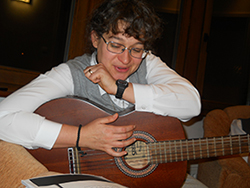Kodály Approach in the Crossroad of Education and Therapy
DOI:
https://doi.org/10.15845/voices.v15i2.804Keywords:
Music therapy, Community Music Therapy, Kodály ApproachAbstract
Kodály's concept about music education is worldwide adapted to different cultures. However, the significance of his theoretical framework is almost undiscovered by music therapy. The aim of the present paper is to shed light on the common elements of Commuity Music Therapy and the Kodály Approach by literature-based Research. Kodály was a pioneer establishing a multidisciplinary dialog between musicology, philosophy, sociology and education. The practice and theory he established was a powerful response to his time’s social needs and problems. As a musician an educator he devoted himself to the popularization community music, choral singing and thus building up a better society. As a researcher he studied the therapeutic effects of his method, especially transfer effect with intellectual and social skills. His overall goal to make music accessible to everyone highly resemble with Community Music Therapy. Many of his ideas such us choral singing for social connectedness or agency and empowerment through musical education are a part of the practice of Community Music Therapy. His concept is a fundamental part of music education but music therapy also could profit more from his ideas.

Downloads
Published
How to Cite
Issue
Section
License
Articles published prior to 2019 are subject to the following license, see: https://voices.no/index.php/voices/copyright

